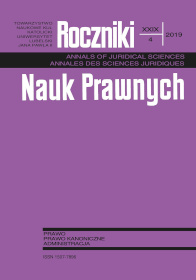The Contribution of Bishops from the Communist States to the Doctrine of the Second Vatican Council in Respect of Church–State Relations
Abstract
The relations between the Church and the State have always been a delicate and complex issue. Its importance and complexity is reflected by the fact that while the Vatican II was improving and developing its modern doctrine on the ecclesiastical and the political community, no separate document to address this issue was being projected. However, ultimately two such documents were created: the Declaration on Religious Freedom Dignitatis Humanae and the Pastoral Constitution on the Church in the Modern World Gaudium et spes.
The article presents the contribution of bishops from the Communist Bloc states to the teaching of Vatican II regarding Church–State relations. When addressing these relations, the Council limited itself to having speeches and written remarks (animadversiones) delivered only by the bishopsrepresentatives of the Communist Bloc, and this perspective has relevance for the presented study. In those states where a system based on a totalitarian regime was in use, any traces of religious life would be eliminated from social life, and combating the Church was a priory for the state authorities. For this reason, the bishops who exercised their daily ministry in communist countries, were supposed to show to make other bishops aware of the real problems facing the Church, using their own experience. Their involvement and voice were consistent with the assumptions of the Council, which were realised as part of aggiornamento, highlighting the modernisation, revival and adjustment of the Church’s activity to changes taking place in the modern world. The outcomes of these bishops’ efforts were, among others: the affirmation of human dignity as the source of religious freedom, which was reserved to every human being, the observation that this freedom is our freedom from coercion to do things contrary with our conscience, the highlighting of parents’ right to educate their children in the faith, the recognition of the pluralism of world views as well as pluralistic society, which requires a model of its relations with the Church, the consideration of mutual independence of the Church and the political community and the need for cooperation, and the observation that Christians have duties both as Church members and citizens of the State.
References
“Nasz specjalny wysłannik Mikołaj Rostworowski telefonuje z Rzymu: Poza Aulą i w Auli.” Słowo Powszechne 18(233):2.
The Second Vatican Council Diaries of Met. Maxim Hermaniuk, C.Ss.R. (1960–1965), trans. Jaroslav Z. Skira. Leuven–Paris–Walpole: Peeters Publishers, Pap/Cdr edition.
Białczyk, Andrzej. 1978. Rozdział między Kościołem a państwem w świetle nauki Kościoła katolickiego, a typed document in the KUL archive. Lublin: Katolicki Uniwersytet Lubelski.
Caprile, Giovanii. 1968a. “Die Chronik des Konzils und der nachkonziliaren Arbeit vom Oktober 1958 bis Dezember 1967.” Lexikon für Theologie und Kirche 3:624–64.
Caprile, Giovanii. 1968b. “Entstehungsgeschichte und Inhalt der vorbereiteten Schemata. Die Vorbereitungsorgane des Konzils und ihre Arbeit.” Lexikon für Theologie und Kirche 3:665–726.
Churchill, Winston. 1974. “Sinews of Peace.” In James R. Rhodes, Winston S. Churchill: His Complete Speeches 1897-1963. Vol. VII: 1943-1949, 7285–293. New York: Chelsea House Publishers, R.R. Bowker.
Goebbels, Joseph. 2000. “Das Jahr 2000.” In https://archive.org/stream/GoebbelsSpeechesArticlesComplete/GoebbelsSpeechesArticlesFromCalvin.edu.Complete_djvu.txt. [the English translation accessed March 13, 2018].
Jaworski, Marian. 2002. “Wprowadzenie do Deklaracji o Wolności Religijnej.” In Sobór Watykański II. Konstytucje, dekrety, deklaracje. Polish text, new translation, 405–409. Poznań: Pallottinum.
Krukowski, Józef. 1980. “Stanowisko Soboru Watykańskiego II wobec rozdziału Kościoła od państwa.” Roczniki Teologiczno-Kanoniczne 27(5):45–63.
Krukowski, Józef. 2000. Kościół i państwo. Podstawy relacji prawnych, 2nd ed. Lublin: Redakcja Wydawnictw KUL.
Melloni, Alberto (edited by). 2015. Atlas historyczny Soboru Watykańskiego II, trans. Paweł Borkowski. Warszawa: Instytut Wydawniczy PAX.
Misztal, Henryk. 2003. “Okres 1945–1989.” In Prawo wyznaniowe, edited by Henryk Misztal, and Piotr Stanisz, 2nd ed., 128–72. Lublin: Wydawnictwo Diecezjalne Sandomierz.
Moeller, Charles. 1968. “Die Geschichte der Pastoralkonstitution.” Lexikon für Theologie und Kirche 3:242–79.
Mutor, Marek. 2013. “Działalność wrocławskiego biskupa Bolesława Kominka w Rzymie w latach 1960–1972.” In Droga do stabilizacji polskiej administracji kościelnej na Ziemiach Zachodnich i Północnych po II wojnie światowej. W 40. rocznicę wydania konstytucji apostolskiej Pawła VI Episcoporum Poloniae coetus, edited by Wojciech Kucharski, 83–99. Wrocław: Ośrodek “Pamięć i Przyszłość”.
Nowacki, Henryk. 1982. Rapporti tra la Chiesa e la communità politica alla luce del n°76 della Gaudium et Spes. Disertatio ad lauream in Facultate Iuris Canonici apud Pontificiam Universitatem S. Thomae De Urbe, Roma: Pontificia Università S. Tommaso d’Aquino.
Philips, Gérard. 1966. “Die Geschichte der dogmatischen Konstitution über die Kirche «Lumen Gentium»”. Lexikon für Theologie und Kirche 1:139–55.
Poupard, Paul. 2005. W sercu Watykanu od Jana XXIII do Jana Pawła II. Rozmowa z Marie-Joelle Guillaume. Katowice: Księgarnia św. Jacka.
Rutkowski, Piotr. 2014. Polscy biskupi jako Ojcowie Soboru Watykańskiego II. Warszawa: Wydawnictwo UKSW 2014.
Sitarz, Mirosław. 2013. “Podstawowe zasady relacji Kościół – państwo w nauce społecznej Kościoła.” Państwo Prawne 1(3):56–68.
Sitarz, Mirosław. 2015. “Zasada równouprawnienia kościołów i innych związków wyznaniowych.” In Katolickie zasady relacji Państwo-Kościół a prawo polskie, edited by Józef Krukowski, Mirosław Sitarz, and Henryk Stawniak, 115–34. Lublin: Towarzystwo Naukowe KUL.
Sitarz, Mirosław. 2016. “Wkład biskupa Walentego Wójcika na rzecz Soboru Watykańskiego II i reformy prawa kanonicznego.” Kościół i Prawo 5(18), no. 2:25–66. Doi: http://dx.doi.org/10.18290/kip.2016.5.2-3
Skrzypczak, Robert (edited by). 2011. Karol Wojtyła na Soborze Watykańskim II. Zbiór wystąpień, trans. Michał T. Szczepański, and Michał Romanek. Warszawa: Centrum Myśli Jana Pawła II, Instytucja Kultury m. st. Warszawa.
Słowikowska Anna. 2013. “Origin of principle of cooperation between the Catholic Church and the State in preparatory documents for the Second Vatican Council. Outline.” Teka Komisji Prawniczej. Polska Akademia Nauk Oddział w Lublinie 6:152–68.
Słowikowska, Anna. 2017. “Podstawy prawne odpowiedzialności wiernych za materialne potrzeby Kościoła.” Kościół i Prawo 6(19), no. 2:123–41. Doi: http://dx.doi.org/10.18290/kip.2017.6.2-10
Sobczyk, Paweł. 2005. Kościół a wspólnoty polityczne. Warszawa: Wydawca Santiago.
Wenger, Antoine. 1963. Vatican II. L’histoire du Schema XIII. Chronique de la troisième session. Paris: Éditions du Centurion.
Copyright (c) 2019 Roczniki Nauk Prawnych

This work is licensed under a Creative Commons Attribution-NonCommercial-NoDerivatives 4.0 International License.


